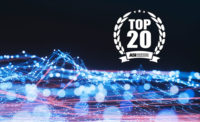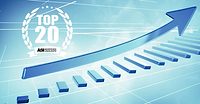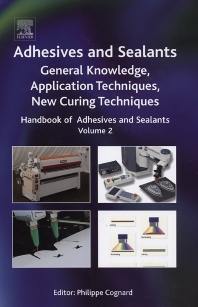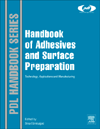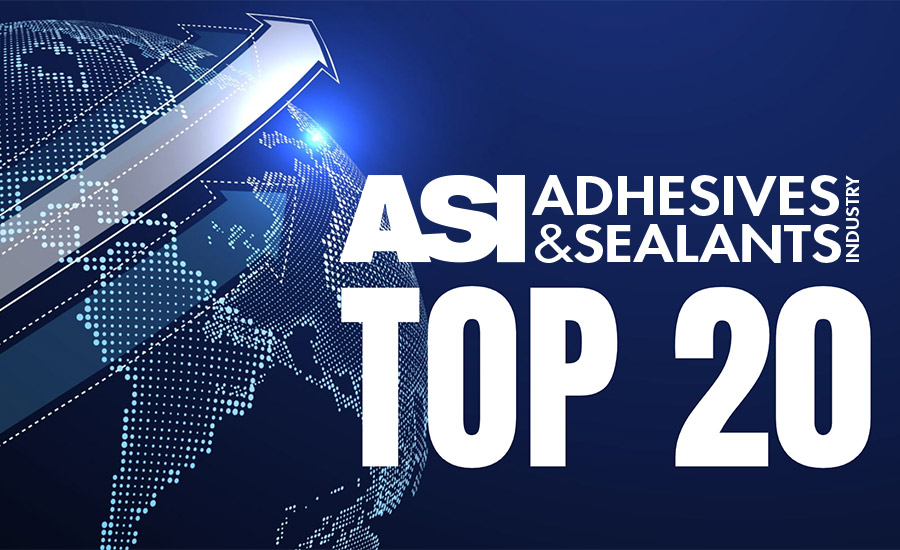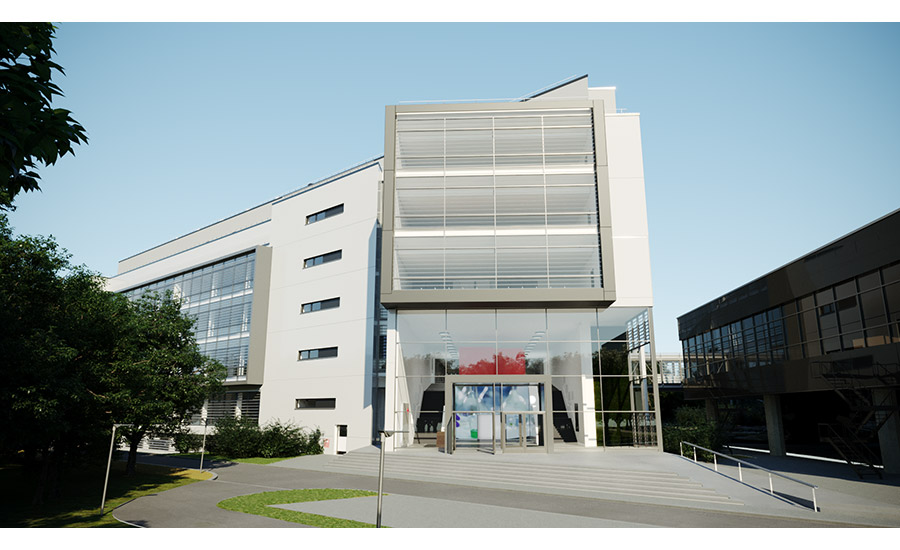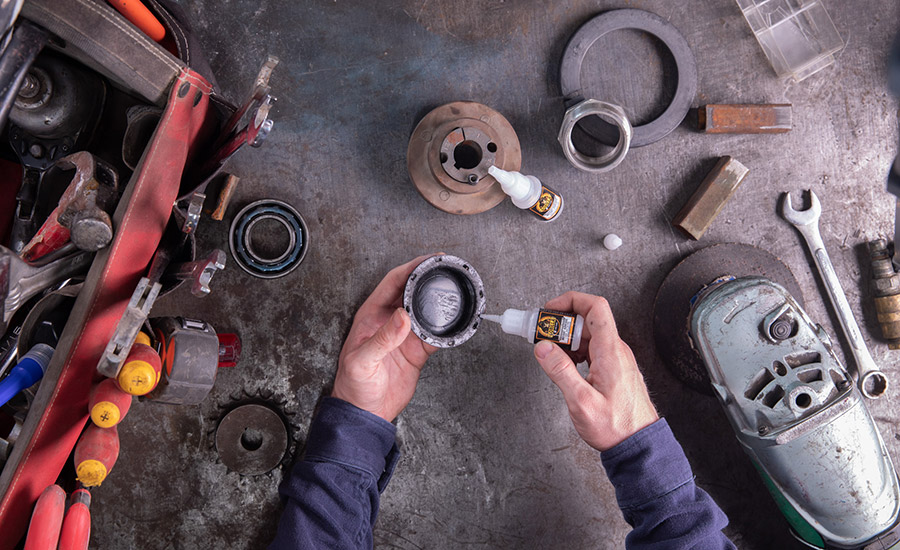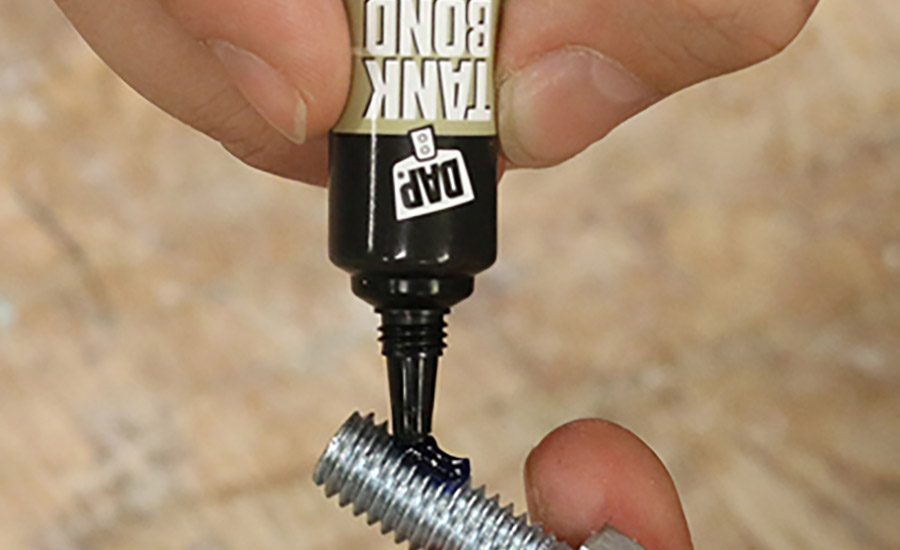2021 ASI Top 20: Leading Global Manufacturers of Adhesives and Sealants
In considering the annual ranking for the ASI Top 20 list of leading adhesive and sealant manufacturers, we focus on sales figures and other details for finished adhesives and sealants, as well as related products such as tapes.
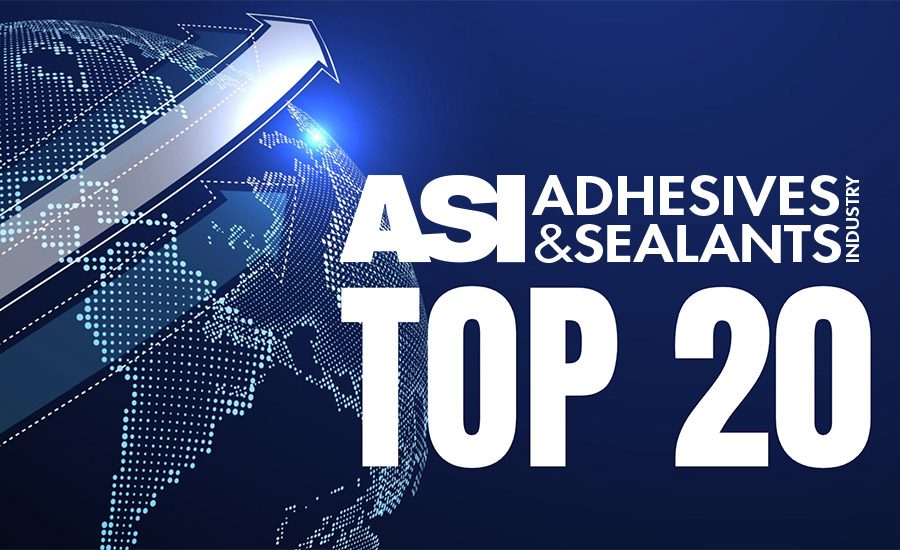
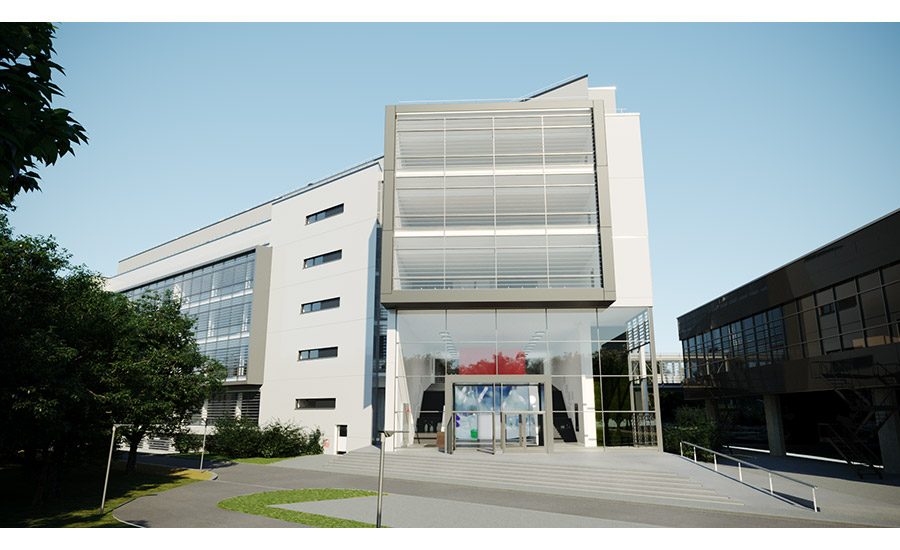
Henkel invested more than €130 million (approximately $158.6 million) in a global innovation center in Düsseldorf, Germany, for its Adhesive Technologies business.
(Photo courtesy of Henkel.)
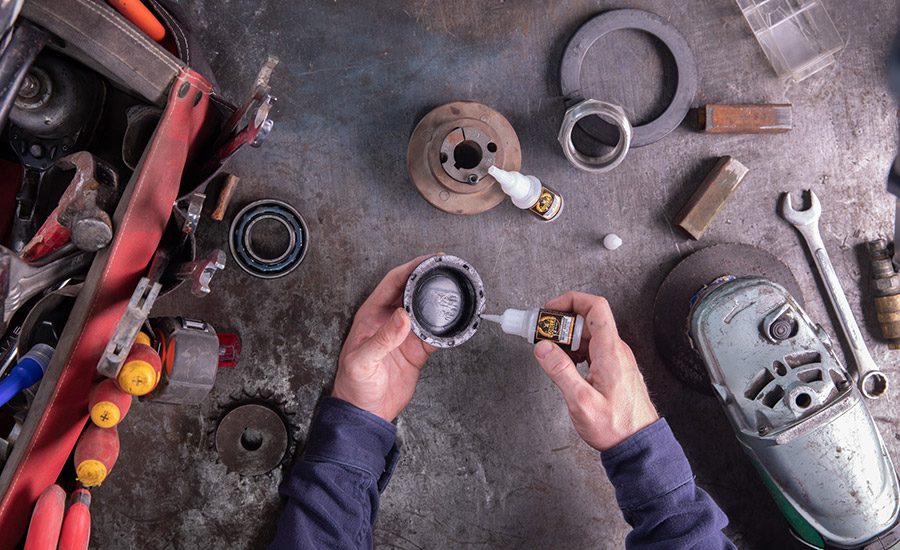
Through its exclusive trademark license with The Gorilla Glue Co. LLC, H.B. Fuller launched a portfolio of professional-grade MRO adhesives, sealants, and lubricants in the U.S. and Canada.
(Photo courtesy of H.B. Fuller.)
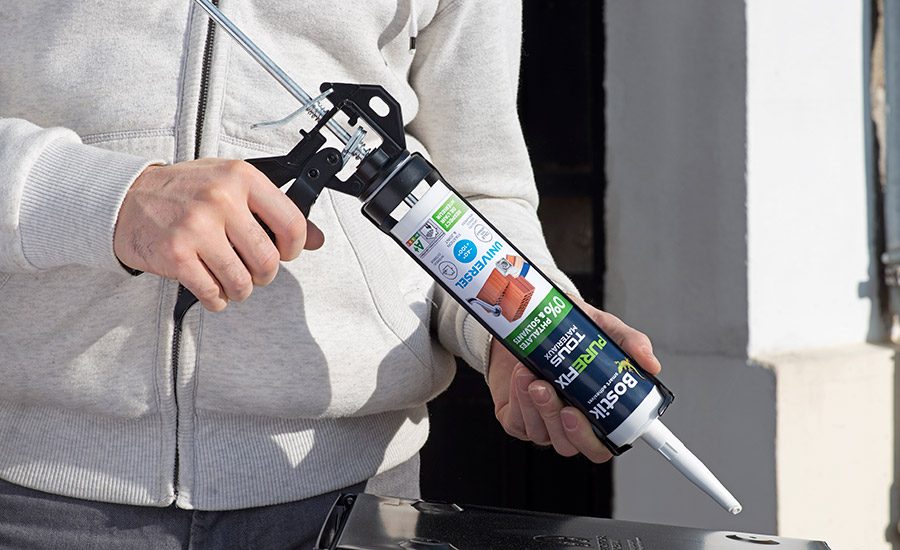
Bostik has found sales opportunities in the construction sector, particularly in the fourth quarter of 2020 and into 2021.
(Photo courtesy of Arkema.)

DAP’s new Tank Bond adhesive line includes threadstopper, liquid grip, heavy-duty advanced epoxy, clear epoxy, and threadlocker products.
(Photo courtesy of RPM.)
![nanpao-COVER[74632]](https://www.adhesivesmag.com/ext/resources/Issues/2021/July/ASI-Top-20/nanpao-COVER74632.jpg?t=1625051429&width=1080)
Nan Pao is projecting adhesives/sealants sales growth for 2021, with opportunities in nonwovens, tapes and labels, flexible packaging, textiles, and woodworking.
(Photo courtesy of Nan Pao.)

From left to right, Jowat SE board of directors Christian Terfloth, Ph.D., Ralf Nitschke, and Klaus Kullmann received the Axia Award for Best Managed Company at the company’s House of Technology in Detmold, Germany.
(Photo courtesy of Jowat SE.)

Mactac supported essential businesses with PPE materials, critical signage, and label materials during the pandemic.
(Photo courtesy of Mactac.)
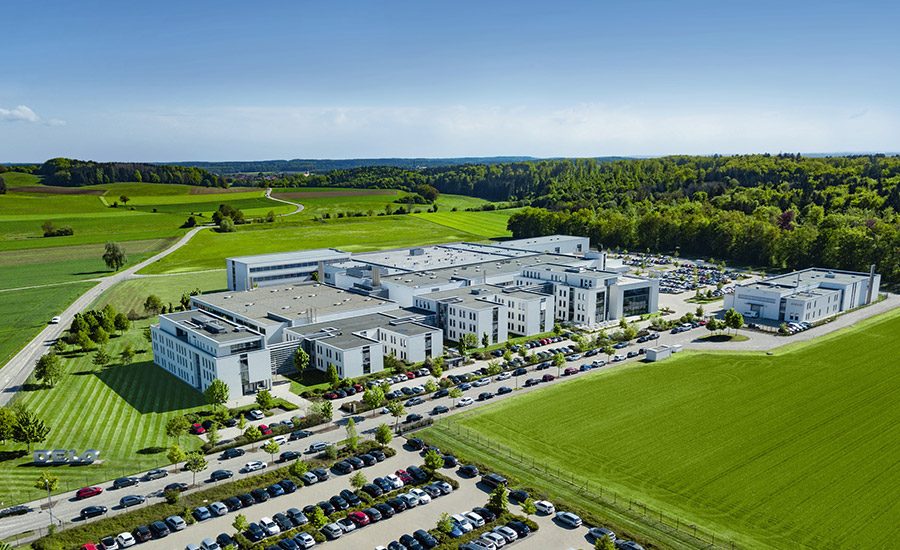
DELO’s headquarters Windach, Bavaria, Germany.
(Photo courtesy of DELO.)






![nanpao-COVER[74632]](https://www.adhesivesmag.com/ext/resources/Issues/2021/July/ASI-Top-20/nanpao-COVER74632.jpg?t=1625051429&width=150)




Welcome to the 2021 ASI Top 20! Every year, we explore the leading worldwide manufacturers of adhesives and sealants to compile this list. In considering the rankings, we focus on sales figures (and other details) for finished adhesives and sealants, as well as related products such as tapes.
A very special thanks goes to those companies that responded to our requests and provided specific details regarding their adhesives and sealants operations and financial results. We appreciate your effort in compiling this information, as well as your trust in us, in some cases, to safeguard it. Your input immeasurably improves the quality of the list and helps ensure that it continues to be seen and used as a global industry resource.
In addition to information supplied by company contacts, we gathered details from annual reports, company websites, press releases, and other sources. In cases where organizations did not respond to our requests or declined to provide adhesives/sealants-focused information, and reasonable estimates could not be made based on publicly available information, some companies did unfortunately have to be left out.
If you would like your company to be considered for the 2022 ASI Top 20, or if you have any questions or suggestions for future rankings, please contact Susan Sutton, editor-in-chief, at (248) 786-1704 or suttons@bnpmedia.com.
Note to reader: Click on a listing to learn more about the company
View All of the 2021 ASI Top 20
Düsseldorf, Germany
CEO: Carsten Knobel
Adhesive Technologies Board Member: Jan-Dirk Auris
Lower demand resulting from closures and other restrictions related to the global COVID-19 pandemic led sales to decline overall for Henkel in 2020. Though sales in the Adhesive Technologies business unit were down by 8.2% for the year, to almost €8.7 billion (approximately $10.6 billion), a company source reports that “the second half of the year saw a recovery in demand across all business segments and regions.”
The Adhesive Technologies segment represented 45% of Henkel’s overall sales in 2020. The company also operates segments for Beauty Care (19% of 2020 sales) and Laundry & Home Care (35%). Compared to 2019, Adhesive Technologies’ share of total sales declined (47% in the prior year), while Laundry & Home Care increased (33% in the prior year).
Four business areas comprise the Adhesive Technologies business unit: Automotive & Metals (22% of the segment’s sales in 2020); Packaging & Consumer Goods (33%); Electronics & Industrials (15%); and Craftsmen, Construction & Professional (30%). While the Packaging & Consumer Goods segment achieved positive organic sales for the year, due mainly to increased demand from the packaging sector, the other three business segments all saw organic sales decline for the year.
“In the first quarter of 2021, sales in the Adhesive Technologies business unit increased nominally by 6.7% percent from €2.2 billion [~ $2.7 billion] in the prior-year quarter to almost €2.4 billion [~ $2.9 billion],” the company source says. “Organically (i.e., adjusted for foreign exchange and acquisitions/divestments), sales increased by 13%. Performance in the first quarter was driven by significant ongoing recovery in industrial production.
“There is still great uncertainty as to how the pandemic will develop and how consumption and industrial output will be impacted. Based on the Q1 results, Henkel revised its guidance for 2021. For the Adhesive Technologies business unit, the performance of which is, to a large extent, dependent on the recovery in industrial demand, Henkel expects organic sales growth to range between 7-9% (previous guidance, 2-6%).”
Despite various pandemic-related challenges and lower demand, Henkel increased its spending on adhesives/sealants-related R&D in 2020 by about 2.5%, to €291 million (~ $355.1 million). Adhesive Technologies represented 58% of Henkel’s total R&D spending for the year.
“In 2021, the Adhesive Technologies business unit aims to continue to align its innovation activities and resources to technology development and expand its partnerships with companies engaging with the three megatrends of mobility, connectivity, and sustainability,” says the company source. “Especially sustainability will remain a key driver of innovation in all markets Henkel serves. With the opening of its new global Innovation Center in Düsseldorf during the course of 2021, the company will further strengthen its R&D capabilities.”
In 2020, Henkel employed (on average) 52,600 people globally; the Adhesive Technologies segment represented 47% of this total workforce. Adhesive Technologies operated 133 production sites in 2020.
Sources: company contact, annual report
St. Paul, Minn.
Chairman and CEO: Mike Roman
3M produces adhesives and sealants, as well as related products such as tapes and films, through its four main business segments: Safety and Industrial, Transportation and Electronics, Health Care, and Consumer. The company employs nearly 95,000 people worldwide.
3M reported that 2020 sales for the Industrial Adhesives & Tapes business within the Safety and Industrial segment was $2.6 billion, accounting for 22% of the segment’s total of about $11.8 billion. This represents a decline of about 5% compared to 2019.
The Stationary & Office business within 3M’s Consumer segment achieved sales of about $1.2 billion in 2020 (23% of the segment’s total of $5.3 billion). This business produces tapes and other office-related adhesive products.
3M invested $1.9 billion in R&D in 2020. In September, the company announced that a Sustainability Value Commitment would be required as part of all of its new product commercialization efforts. “Sustainability has always been at the core of 3M—but we’re looking to do more,” said John Banovetz, chief technology officer. “We are proud to formalize our commitment to this next step in innovating for a sustainable future.”
Sources: annual report, company website, press releases
Glendale, Calif.
President, CEO, and Chairman of the Board: Mitch Butier
Avery Dennison’s total 2020 net sales were down by 1.4% compared to the prior year, due mainly to the COVID-19 pandemic, reaching almost $7 billion. (The company declined to provide specific adhesives/sealants-related sales and other details.)
Avery Dennison operates in three business groups: Label and Graphic Materials (LGM), Retail Branding and Information Solutions (RBIS), and Industrial and Healthcare Materials (IHM). LGM, which produces pressure-sensitive labels and graphics, saw sales dip about 1% in 2020, to almost $4.8 billion. IHM, which produces tapes, adhesives, and other fasteners, experienced a steeper decline of 7% due primarily to COVID-19 impacts on the automotive market. The segment achieved net sales of $631.9 million.
The company’s 32,000 employees work in over 50 countries. Total R&D spending increased by almost 22% in 2020, to reach $112.8 million.
Sources: annual report, company website, press releases
St. Paul, Minn.
CEO: Jim Owens
H.B. Fuller employs over 6,000 people worldwide. The company’s net revenue for its 2020 fiscal year (ended November 28, 2020) declined by 3.7% to nearly $2.8 billion, due primarily to various impacts of the COVID-19 pandemic. Organic revenue dipped 1.6% compared to the prior fiscal year.
H.B. Fuller operates in three main business segments: Hygiene, Health and Consumable Adhesives (representing 48% of 2020 total net revenue); Engineering Adhesives (39%); and Construction Adhesives (13%). Net revenue for Hygiene, Health and Consumable Adhesives, which produces adhesives for sectors such as packaging, medical, and hygiene, was essentially flat in the 2020 fiscal year at about $1.3 billion.
The Engineering Adhesives segment serves customers in industries such as transportation, electronics, and energy; 2020 net revenue declined by 6.1% to about $1.1 billion. Net revenue for Construction Adhesives also declined in fiscal 2020, by 6.9% to about $369 million.
“The diversity of H.B. Fuller’s products and customer set enabled us to mitigate the effects of COVID-19 on our business, and historically have supported resiliency in margins and cash flow during economic downturns,” says a company source. “For example, while automotive and commercial construction markets were suppressed in 2020, we saw an increase in demand for our paper tissue and towel, packaging and hygiene products.”
Along those lines, the company is cautiously optimistic for 2021. “Growth in some end markets, such as commercial construction and aerospace, will improve at a slower pace and may not yet return to 2019 levels of activity,” the source says. “Elevated demand for hygiene and health products, packaging, paper, and tissues and towels will likely continue into 2021 as consumers continue to spend more time in their homes.
“We anticipate Construction Adhesives’ end markets to continue to show steady improvement throughout 2021 with commercial activity improving throughout the year and residential activity remaining solid. Engineering Adhesives’ end market demand will likely remain at elevated levels in early 2021, reflecting increased production activity to meet some pent-up demand, returning to more typical activity levels in the second half of the year.”
H.B. Fuller invested in growth in Asia and South America in 2020, with an expansion of its site in Yantai, China (supports the electronics and energy industries), and the launch of a new global center of excellence in Rionegro, Colombia (for hygiene adhesives). In addition, the company has additional plans for new facilities in China and Egypt.
Sources: company contact, annual report, press releases
Colombes, France
Chairman and CEO: Thierry Le Hénaff
Arkema operates in four business segments: Adhesive Solutions, Advanced Materials, Coating Solutions, and Intermediates. Bostik, which is Arkema’s Adhesive Solutions segment, represented 25.5% of group sales in 2020 (a slight increase over 2019’s 24%). As a result of COVID-19, Bostik saw sales decline by 2.9% for the year, to almost €2 billion (~ $2.4 billion).
The segment reported growth of 2.7% in the 2020 fourth quarter, however, with opportunities realized in construction and engineering adhesives. Bostik’s sales in the 2021 first quarter accelerated this growth rate to reach €555 million (~ $677.2 million).
“In first quarter 2021, sales for the Adhesive Solutions segment were up 7.8% compared to first quarter 2020, primarily driven by the rise in volumes,” says a company source. “Momentum remained strong in the construction and DIY markets, and the segment also benefited from the recovery of industrial markets in high-performance adhesives.”
In the fall of 2020, Arkema announced that it had inaugurated a new adhesive facility in Japan intended to enable Bostik to serve its Japanese customers in the diapers, hygiene, packaging, labelling, transportation, and electronics markets. In addition, the group clearly intends to grow the Adhesive Solutions segment through acquisitions, with 2020 buys including LIP Bygningsartikler AS, Fixatti, and Ideal Work. To date in 2021, Bostik has invested in Crackless Monomer Co., acquired Poliplas, and announced that it plans to acquire Edge Adhesives Texas.
Sources: company contact, annual report, press releases
Baar, Switzerland
CEO: Thomas Hasler
Sika employs nearly 25,000 people worldwide and achieved 2020 total net sales of almost CHF 7.9 billion (~ $8.8 billion). This represents a 3% decline compared to the prior year, primarily due to the impact of the COVID-19 pandemic. The company invested CHF 193.6 million (~ $215.6 million) in R&D in 2020, a decrease of 4% from 2019.
Sika did not respond to requests for specific adhesives/sealants details, but it cites adhesive systems as one of its five core technologies (along with concrete technology, coating systems, cementitious systems, and thermoplastic systems). The company’s total 2020 net sales of products for the construction industry were fairly flat at about CHF 6.4 billion (~ $7.2 billion), representing 81.7% of total sales for the year. The remainder of 2020 sales (18.3%) were for the industrial manufacturing sector; here, sales declined by almost 13% to around CHF 1.4 billion (~ $1.6 billion).
Sika’s target markets include: Concrete, Waterproofing, Roofing, Building Finishing, Flooring, Sealing & Bonding, Refurbishment, and Industry. The group produces adhesives and sealants, as well as related products, for almost all of these markets. Products range from roofing adhesives and tapes for waterproofing systems to structural adhesives and various offerings for building envelope applications.
Sources: annual reports, company websites, press releases
Medina, Ohio
Chairman and CEO: Frank C. Sullivan
RPM operates in four business segments: Construction Products Group (representing 34% of fiscal 2020 net sales), Consumer Group (35%), Performance Coatings Group (20%), and Specialty Products Group (11%). Total sales dipped by 1% for the 2020 fiscal year (ended May 31, 2020), to $5.5 billion. Organic sales declined by 0.8%, while acquisitions added 1.1% and foreign currency translation reduced sales by 1.3%. Regionally, RPM operates predominantly in North America (representing 75% of fiscal 2020 net sales), followed by Europe (17%), South America (4%), Asia-Pacific (3%), and Africa/Middle East (1%).
The company did not provide specific adhesives/sealants details. Each business segment produces numerous product ranges, with adhesives and sealants found mainly in the Construction Products Group and the Consumer Group. According to RPM, its DAP business leads in brand recognition and market share in the U.S. and Canada for the caulk and sealant residential market, as well as in the U.S. for wall and wood repair products.
In 2020, RPM aligned several divisions to create Tremco Construction Products Group (Tremco CPG). The impacted operating units included Tremco’s Commercial Sealants & Waterproofing, Roofing & Building Maintenance, and Barrier Solutions, as well as Dryvit, Nudura Inc., Willseal (Schul International Co., LLC), and Weatherproofing Technologies.
Sources: company website, consolidated financial results, fact book
Tokyo, Japan
President and CEO: Makoto Hattori
LINTEC reported a 2% decline in net sales for its 2021 fiscal year (ended March 31, 2021), due primarily to the global pandemic, though demand for its products in semiconductors and electronics was consistently robust. The group employs over 4,900 people worldwide. Investment in R&D declined slightly in the 2021 fiscal year.
LINTEC operates in three business segments: Printing and Industrial Materials Products (adhesives for seals and labels, automotive adhesives, industrial adhesive tapes, films for various end uses, and other products); Electronic and Optical Products (semiconductor- and multilayer ceramic capacitor-related tapes, optical display tapes, and other products); and Paper and Converted Products. Mactac is part of the Printing and Industrial Materials Products segment (listed separately*).
(*Editor’s note: Since Mactac, LINTEC’s U.S. subsidiary, provided adhesives/sealants-related details and requested that they be withheld, specific sales levels for LINTEC will likewise not be published to avoid any conclusions potentially being drawn. Mactac’s sales were subtracted when determining LINTEC’s ranking.)
Sources: company website, consolidated financial results, fact book
Glenview, Ill.
Chairman and CEO: E. Scott Santi
ITW is organized into seven business segments, two of which produce adhesives and related products. The company did not respond to requests for adhesives/sealants details.
With 2020 operating revenue of $2 billion (representing 15.9% of ITW’s total 2020 revenues), the Test & Measurement Electronics segment manufactures pressure-sensitive adhesives for electronics, medical, transportation, and telecommunications markets (among many other products). Revenue declined about 7.4% for the segment during the year, though the pressure-sensitive adhesives businesses saw a bit of an increase in North America.
ITW’s Polymers & Fluids segment, which represented 12.7% of total revenue for the year, manufactures adhesives and sealants for the industrial, construction, and consumer markets (among many other products). Operating revenue for this segment was about $1.6 billion in 2020, a decrease of 2.8% compared to 2019.
Sources: annual report, company website
The Woodlands, Texas
Chairman, President and CEO: Peter R. Huntsman
Huntsman’s Advanced Materials division “provides specialty epoxy, acrylic and polyurethane-based polymer resin systems and adhesive products.” According to Simon Thering, business development leader Adhesives, the company’s 2020 revenue for adhesives/sealants and related products was $840 million.
The Advanced Materials division represented 14% of Huntsman’s overall 2020 sales of $6 billion. The company attributed the division’s 20% drop in revenue for the year to reduced sales volumes in all of its markets, mainly as a result of the COVID-19 pandemic.
In November 2020, Huntsman announced that it had sold its India-based DIY consumer adhesives business to Pidilite Industries Ltd. The all-cash transaction was valued at up to $285 million.
Sources: company contact, annual report, press release
Wilmington, Del.
CEO: Ed Breen
Parent Company: DuPont de Nemours, Inc.
Following a number of strategic divestments, DuPont operates with three business segments: Electronics & Industrial, Water & Protection, and Mobility & Materials. According to a company source, 2020 revenue for adhesives, sealants, and related products was $750 million.
“DuPont Mobility & Materials has joined our customers and colleagues in the aggressive business recovery from the COVID-19 pandemic,” says Christophe van Herreweghe, global marketing director, Advanced Solutions for DuPont Mobility & Materials. “In the mobility sector, we are seeing increased demand for electric vehicles. Lightweighting, safety, durability and performance are also important drivers for these emerging vehicle builds—all supported by structural and thermal-conductive adhesive technology. In fact, we are happy to be celebrating the 60th anniversary of our BETASEAL™ glass bonding systems and launching our all-new BETATECH™ thermal interface material this year.
“We are experiencing especially high demand for these and other automotive adhesives and are responding with $35 million investments in a new facility in China and facility upgrades for expanded capacity in Europe. The outlook in North America is also optimistic, and demand in China is already back to pre-COVID levels.”
Sources: company contact, earnings presentation
Munich, Germany
President and CEO: Christian Hartel, Ph.D.
WACKER’s total sales declined by 5% in 2020, mainly as a result of the COVID-19 pandemic, to nearly €4.7 billion (~ $5.7 billion). The silicones division produces silicone sealants and numerous other silicone products, including fluids, resins, elastomers, silanes, and pyrogenic silica for industries such as construction, medical, electronics, and transportation. Sales declined by 8.5% in 2020, to €2.2 billion (~ $2.7 billion). The company did not provide specific adhesive/sealant-related financial information.
According to a company source, WACKER SILICONES is a fully backward-integrated provider of one-part, ready-to-use silicone sealants. In the construction sector, the company’s silane-modified hybrid polymers offer several opportunities in sealant formulations and offer unique properties as an adhesive.
Sustainability is one of the key drivers for future growth, the source reports. For this reason, the company launched ELASTOSIL© eco, a silicone sealant product range based on fossil-free methanol.
Sources: company contact, annual report
Evansville, Ind.
Chairman and CEO: Tom Salmon
Berry Global produces adhesives, sealants, and tape products for industries such as packaging and construction. The company’s tape business, traditionally part of the Engineered Materials business segment, was recently shifted to the Health, Hygiene & Specialties segment to take advantage of synergies associated with the segment’s nonwoven products.
In 2020, Berry Global’s total net sales reached $11.7 billion, an increase of 32% compared to the prior year. Growth was primarily attributed to acquisitions; organic volume increased by 2%. Net sales in the Engineered Materials segment declined by 8%, to about $2.3 billion.
Sources: annual report, investor presentation
Mumbai, India
Chairman: Madhukar Parekh
Pidilite generated total net sales of Rs 7,251 cr (~ $994.9 million) in its 2021 fiscal year (ended March 31, 2021); this represents a decline of 2.4% compared to the prior fiscal year. The company operates 28 plants and three R&D centers in India, as well as an R&D center in both Singapore and the U.S. It also has manufacturing facilities in the U.S., Thailand, Dubai, Brazil, Egypt, Bangladesh, Sri Lanka, and Kenya.
Pidilite’s business comprises three industry segments: Consumer & Bazaar Products (81.2% of total fiscal 2021 sales), Business to Business Products (18%), and Others (0.8%). The Consumer & Bazaar Products segment produces adhesives and sealants (54.2% of total fiscal 2021 sales), construction and paint chemicals (19.9%), and art and craft materials (7.1%). Business to Business Products includes industrial adhesives (5.7%), industrial resins and construction chemicals (6.4%), and pigments and preparations (5.9%).
In November 2020, Pidilite acquired Huntsman’s India-based DIY consumer adhesives business in a transaction valued at up to $285 million. “Araldite is an iconic brand and a market leader in Epoxy Adhesives in India,” said Apurva Parekh, executive director of Pidilite. “We are thankful for all the support extended by the Huntsman group and we are confident that our association will remain strong going forward as well.”
Sources: company analyst presentation, company website, press release
Tainan City, Taiwan
CEO: Elic Hsu
Nan Pao produces footwear adhesives, as well as other specialty and hot-melt adhesives, among other products. According to Roy Cheng, manager of the U.S. division, revenue for adhesives, sealants, and related products topped $401 million in 2020.
“Compared to 2019, the COVID-19 pandemic resulted in a distortion of normal revenue patterns in the first half of 2020,” he says. “By the 2020 second quarter, the gradual reopening of economies and consumer buying via sportswear ecommerce channels drove sales to rebound. Strong sales of hot-melt glue for hygiene and construction, and tape and label adhesives supported top-line performance. Overall, revenue on adhesives/sealants fell 11% YoY.”
Nan Pao is projecting adhesives/sealants sales growth for 2021, with opportunities in nonwovens, tapes and labels, flexible packaging, textiles, and woodworking. “We are shifting towards fewer product types and longer, high-volume production runs to achieve higher sustainable gross margins,” says Cheng.
The company employs over 2,900 people and operates factories and subsidiaries in Taiwan, China, Vietnam, Indonesia, Thailand, Malaysia, India, the Philippines, Singapore, and Australia. Sales in 2020 by plant location were from: mainland China, 35%; Taiwan, 20%; Vietnam, 24%; Australia, 13%, and Southeast Asia (except Vietnam), 8%.
Nan Pao invested $17.9 million on adhesives/sealants R&D in 2020, a 12% increase compared to 2019. “We will hold fast to innovation, systematically searching to apply existing core technology to new product opportunities,” Cheng says. “Thus, we expect adhesives/sealants R&D spending of sales for 2021 are likely to be similar to 2020.”
Sources: company source, company website, investor presentation
Detmold, Germany
Board of Directors: Klaus Kullmann, Ralph Nitschke, and Christian Terfloth, Ph.D.
Founded in 1919, family-owned Jowat SE does business through 23 affiliated companies and sales in 80 countries around the world. In 2021, for the second year in a row, the company was honored with the Axia Best Managed Company Award.
“The Best Managed Company Award recognises companies from the German Mittelstand that are exemplary for what is rightfully referred to as the backbone of the economy,” said Mischa Tschopp, market group head Germany and Austria International at Credit Suisse, one of the award organizers. “Even in extraordinary times, enterprises like Jowat not only weather the pressure, but also flourish. They open a path to the future in times of crisis by recognising the increased urgency of new developments such as digitalisation and sustainability and implementing them in a way useful for society.”
Strategic vision, innovative strength, a sustainable leadership culture, and good corporate management: these are the fields in which enterprises competing for the Axia Best Managed Company Award must excel. They are benchmarked in a thorough, multi-stage process, after which the winners are selected by a jury of representatives from business, science, and the media.
“We are extremely honoured to be recognised again as a Best Managed Company,” said Ralf Nitschke, Jowat SE managing director. “The award also assures us that our strategic approach, guided by sustainability with our employees and business partners is the right path into the future.”
Sources: company contact, company website, press release
Stow, Ohio
CEO: Edward LaForge
Parent Company: LINTEC Corp.*
Mactac produces pressure-sensitive adhesives and related products such as tapes and films. The company employs 500 people in North America.
“We are expecting significant growth [in 2021] due to the introduction of new products and overall strong market demand,” says Janet Page, senior marketing manager. “The recent Duramark Products (Ritrama US) acquisition will diversify our adhesive platforms and expand our reach into new customer markets.”
Mactac’s acquisition of Duramark included facilities in Minneapolis, Minn., and Moore, S.C., which employ 170 people. Mactac plans to expand R&D, quality, and production at these facilities, including adding a significant number of new jobs.
(*Editor’s note: A listing for LINTEC is included separately.)
Sources: company contact, company website, press release
Dublin, Ohio
CEO: Guillermo Novo
Parent Company: Ashland Global Holdings, Inc.
Ashland’s Performance Adhesives segment produces pressure-sensitive and structural adhesives, as well as laminating adhesives and coatings. Key markets include packaging, transportation, and construction. Performance Adhesives, which operates six facilities in the U.S. and the UK, represented 13% of Ashland’s total sales in 2020.
Net sales for the segment declined by about 10% in 2020, to $310 million, due primarily to lower volumes as a result of the COVID-19 pandemic. Regionally, Performance Adhesives sold primarily into North America (about 85% of 2020 sales); remaining regions include Europe (11%), Asia-Pacific (2%), and Latin American and Other (2%).
In May 2021, Ashland announced that it would conduct a strategic review of the Performance Adhesives segment. In a press release, the company attributed CEO Guillermo Novo as indicating that he expects the combination of strong financing availability, low interest rates, and improving global macroeconomic conditions to create a supportive backdrop for a potential sale of the business unit.
Sources: company contact, annual report, press release
Windach, Germany
Managing Board: Wolf-Dietrich Herold, Ph.D.; Sabine Herold; Robert Saller
DELO achieved a revenue increase in its 2021 fiscal year (ended March 31, 2021). “Despite the global Covid-19 pandemic and its resulting major fluctuations in demand, DELO recorded revenues of €167 million [~ $203.9 million], a growth of 2% over the previous year’s €163 million [~ $199 million],” says Matthias Stollberg, head of Corporate Communications. “Particularly strong, double-digit revenue growth was recorded in Japan and South Korea.
Regionally, about half of DELO’s revenues were earned in Europe and North America in its fiscal 2021 year, with the remaining portion coming from Asia. China alone accounted for 35% of DELO’s revenues, while Germany represented 19%. The company’s key industry segments included: consumer electronics, 30%; automotive, 25%; and semiconductor, 20%.
DELO maintained its R&D spending throughout calendar year 2020, at about 15% of its annual revenues. Stollberg expects this spending level to continue through 2021.
In 2020, DELO focused particularly on high-tech adhesives that, in fact, are multi-functional polymer materials with additional properties,” Stollberg says. “Examples include liquid pressure-sensitive adhesives, adhesives as balancing compounds, and light-curing adhesives for liquid additive manufacturing.
DELO currently employs 820 people. During its 2021 fiscal year, DELO commissioned a new production hall with an area of about 8,000 m2 and several production lines. In addition, the company founded a subsidiary in Malaysia to reinforce existing activities.
Source: company contact, company website, press release
City of Industry, Calif.
CEO: Brad Boyle
According to Patrick Boyle, president and chief operating officer, General Sealants’ net sales were down by about 11% in 2020, compared to 2019. However, the company is optimistic about growth in 2021.
Net sales for General Sealants have increased 74% in 2021 compared to the same period in 2020, and sales are projected to remain strong for the remainder of 2021,” he says.
The company produces products such as butyl tapes, various sealants (e.g., polysulfide, polyolefin, polyacrylic, silicone, and more), and vacuum bag sealant tapes. Markets served include automotive, aerospace, telecommunications, composites, industrial manufacturing, and infrastructure-related applications. General Sealants does business worldwide; more than 60% of its customers are outside the U.S.
General Sealants’ R&D spending increased by about 10% in 2020. Boyle expects that it will increase in 2021 as well.
Sources: company contact, company website
Editor’s note: The ASI Top 20 is based, in part, on publicly available financial information, including annual sales/revenue, along with details supplied by company contacts and other sources. Information was verified whenever possible, but adhesives/sealants-related details have been estimated in some cases. In other cases, details for privately held companies have been withheld on request. Financial figures are generally rounded, and the timing of currency conversions may impact specific figures/results.
Where specific and verifiable information was not provided and reference materials were not readily available, some companies unfortunately had to be left out. If you have questions or would like details regarding how to have your company considered for future ASI Top 20 rankings, contact Susan Sutton, editor-in-chief, at (248) 786-1704 or suttons@bnpmedia.com.
Looking for a reprint of this article?
From high-res PDFs to custom plaques, order your copy today!




